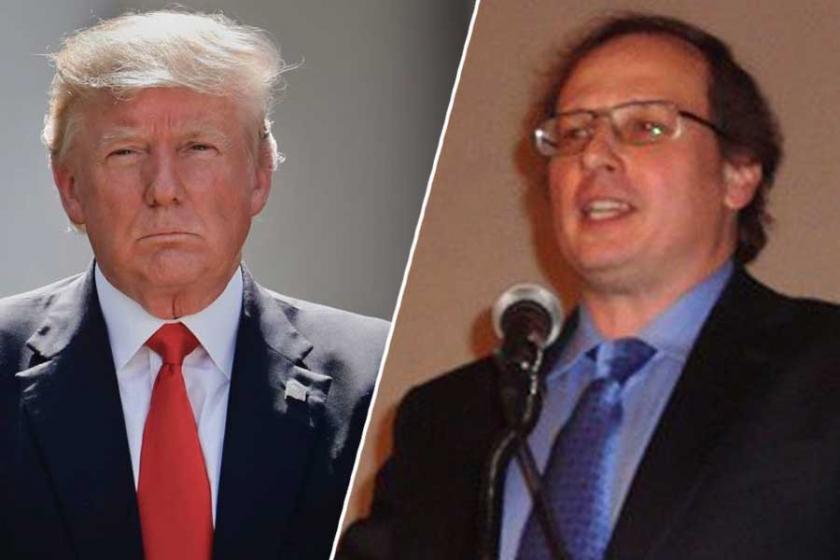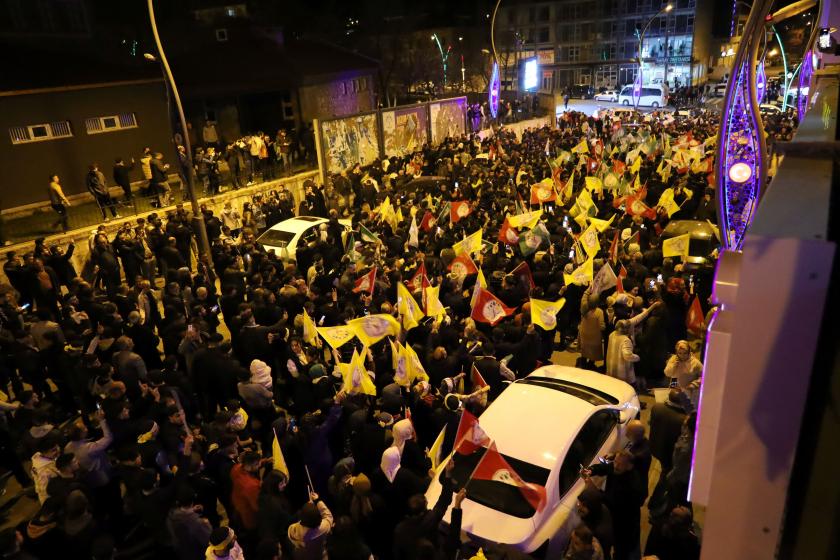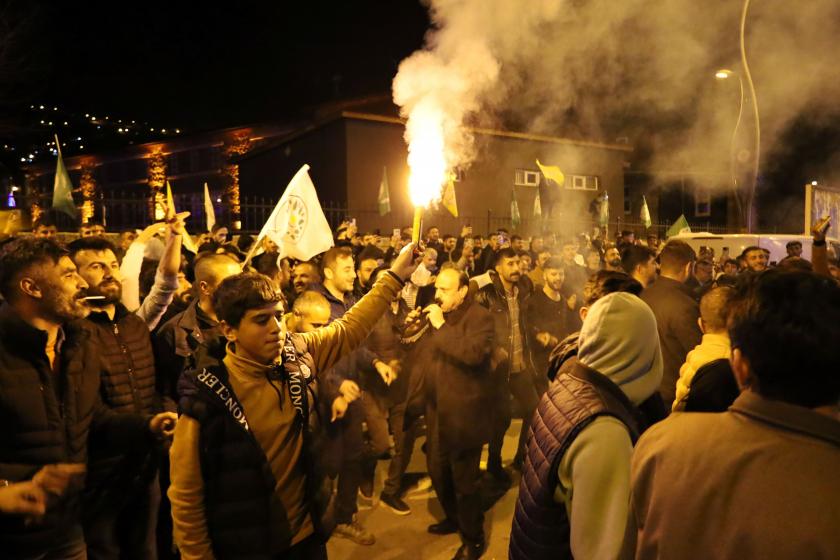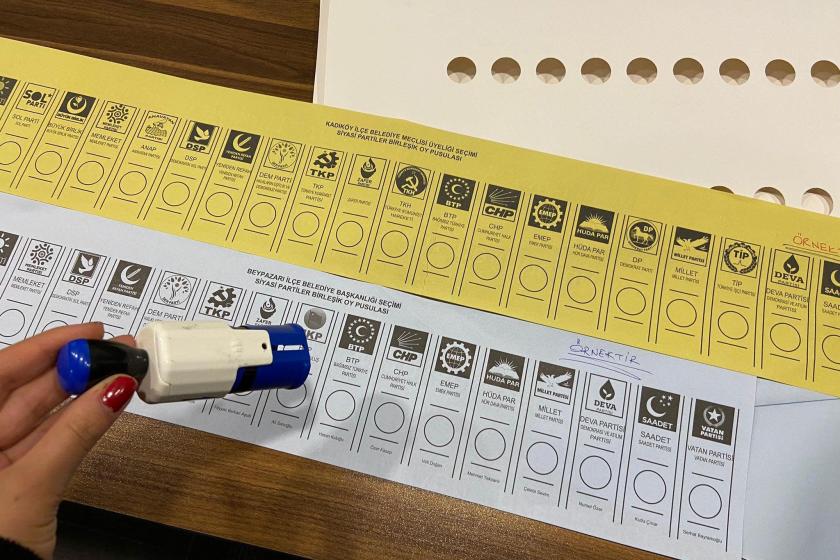What are the US ruling classes fighting over?
Professor Barry Lituchy: Interests of different segments of ruling classes in the US differ in particular situations but they're historically united.
19 March 2018 08:24
Professor Barry Lituchy: Interests of different segments of ruling classes in the US differ in particular situations but they're historically united.

Ekim KILIÇ
New York
Since the US President Donald Trump was elected, his name has been associated with scandals. Discussions on his possible impeachment are still ongoing either openly or implicitly. The FBI is investigating his relationship with Russia.
We conducted an interview with Barry Lituchy, a history professor at Medgar Evers College, to elaborate on events between Trump and the US rulers, and the internal conflicts of the US ruling classes. Lituchy emphasizes that Trump is ‘an outstanding exception’ in terms of the US ruling classes. However, he adds that although interests of different segments of ruling classes differ in particular situations, they are historically united and they compromise on who is going to be in charge of the system.
How can we categorize American ruling classes? What kind of cliques are American ruling classes made up of?
The American ruling class consists of the wealthiest 1% or less of the population and the power elites. Within the power elites, you have the managers of the state: the government and the politicians of the two-party system, the military-industrial-intelligence complex and the deep state (the people who work in these state institutions all of their lives). There is also the mainstream media which is a part of the ruling class because it is owned by leaders of the ruling class and because it is the mouthpiece of the deep state.
What is the power relationship between them?
The US political system is an oligarchy codified in the constitution of 1787 which used the term “republic” as in the Roman Republic to describe this oligarchic system. The constitution provides that there can be no other form of government in the US other than a republic or oligarchy in Article 4 Section 4 of the Constitution. In other words, it would be illegal to try and change the political system of the US.
Thus, the richest people in this country have nothing to fear short of a revolution because by law the constitution guarantees their permanent monopoly on power against the interests and wishes of any other class of people. It is then necessary for the ruling rich simply to buy power with their wealth in the political marketplace, which means buying politicians and aligning their interests with politicians and lobbying groups that serve their interests. There is no conflict between the ruling class and the state. But there are disagreements within the ruling class.
What can we say about the development of these cliques if we look at the 20th century? What are their arguments against each?
First of all, I would say that they have been historically united. If you look at the top 100 richest people in America you can see what their economic interests are and the sources of their wealth. The main categories are (1) internet and computer technologies, (2) financial industries and Wall Street, (3) oil and gas, (4) real estate, (5) media and tv, (6) big merchant retailing, (7) drugs and health care, and (8) a manufacturing elite which is still powerful but much less so than before. The biggest concerns of these groups are free to trade, immigration and taxes. But you cannot say that these various sectors of the economy are in conflict. Individuals within each of these sectors are sometimes in conflict with each other. The US ruling class is largely in agreement on these issues, although there are some disagreements. For example, some sectors of the economy do not want open immigration. The majority of the ruling class wants it because it drives down the price of labour and makes capital far greater profits. But a minority of the ruling class sides with the native working class which sees its standard of living destroyed by low wages as a result of open borders and free trade. Basically, all sectors of the ruling class benefit from low wages, so there is really limited disagreement on the need for free trade and open borders for immigration including illegal immigration which is extremely profitable. But the problem right now is that the President of the US elected in 2016 is an opponent of both open borders and free trade, or at least not very supportive of it. It is completely logical that he happens to come from the real estate sector of the ruling class because it is this sector that benefits the least from the open border and free trade. Real estate capitalists benefit from higher wages and higher incomes because this creates greater consumer demand for real estate. There is not much benefit from lower wages and lower incomes for real estate capitalists, so they are the one group less likely to favour free trade and open immigration. This explains why Trump takes the positions he takes. And his position matches the interest of most working people in the US who are hurt by free trade and open immigration. By the way, Trump was also supported by people in the casino industry such as Sheldon Adelson and Steve Wynn who also don’t have much interest in free trade and open immigration and benefit from higher disposable incomes.
To what extent and on which points do the cliques of American ruling classes compromise? And what do they confront for? How does the situation of the economy affect this compromises and conflicts?
The first issue that they have solid agreement on is the power of the state: the preservation of the oligarchy against all enemies, foreign and domestic. This means the military-industrial-intelligence complex, which is financed with over 50% of all of our taxes. There is no disagreement that the US military must be all-powerful and must destroy or weaken all potential enemies or challenges to its supremacy around the world. There is more disagreement on economic issues, but even here is it limited. Only a small percentage of the ruling class favour protectionist policies on trade, on immigration, although Trump is an outstanding exception, and on taxes, there is only limited support for maintaining high taxes. Trump’s tax plan did not cut taxes as much as people think, but it is geared to helping certain segments of the upper classes. In general, Trump is not very different on the question of taxes from other Republicans and Democrats. He is maintaining high taxes. But we have seen a gradual reduction in the amount of taxes the rich pay since Ronald Reagan, and Trump continued that. The US ruling class has rejected a Keynesian type policy for the past 30 years, both in terms of using taxation to maintain more social welfare programs, education and infrastructure, and for keeping a more progressive welfare system. The ruling class has been fairly united on using all of the tools of the state including tax revenues for building a system of socialism for the rich in which everything is geared to making the rich richer and keeping everyone else down.
This trend is reflected across the entire capitalist world, creating ever greater inequality and problems for the working classes. The two political parties are simply arms of the ruling class and, while they reflect some slight disagreements on issues, for the most part, what they mostly fight over is which party is going to be in power. For example, both parties support the gun lobby even though most Americans want gun control. Both parties are in very broad agreement on most issues including maintaining inequality in the US. Young people in the US are increasingly pro-Socialist and anti-capitalist. But the two political parties will never allow even a Bernie Sanders to come to power. Mainly, the two political parties create a false sense of choice when in fact they offer no choice but continued oppression.
In terms of foreign policy, the ruling class depends on the power elites and the deep state to manage it, but Trump has caused a huge disagreement because of his unilateralist policies which go against the interests of the deep state more than against the rich elites. For this reason, he is hated by many in the deep state across the military-industrial-intelligence complex and among all government employees. US domination of European affairs has been severely undermined by Trump’s failure to lead NATO against Russia.
This is a huge problem for the ruling class because the deep state sees the potential for gaining greater control over Europe by putting more military and economic pressure on Russia. They believe that by undermining Russia the US can also threaten and weaken China’s foreign policy by making them less likely to act against US interests. Ultimately, destroying Russia is seen as the key to controlling the world. US foreign policy is in a big mess because of Trump.
Of course, the Democratic Party also hates Trump for defeating their candidate Hillary Clinton and reducing their power in all areas of the country.
But they are fighting back by supporting a more aggressive anti-Russian and pro-NATO foreign policy agenda which reflects the interests of the deep state and finds its reflection in much of the mainstream media.
What are their plans for the US administration? What are your predictions?
A year ago, I would have predicted that Trump would have surrendered to the deep state and changed his foreign policy. But now that the Mueller investigation has forced Trump into a corner where he must fight for his survival, he will not compromise. Obviously, Trump is too unpopular on foreign policy, on free trade, and on immigration for a large segment of the ruling class. They determined they needed to try and remove him or at least pressure him into changing his policies. He might still decide it is better to give up and compromise on these policies than fight. But that decision will be influenced by the mid-term elections later this year.
Trump’s possible impeachment has been discussed for a long time. And Nixon’s impeachment was given as an example of what if Pence becomes the president. Is it possible that Trump can be impeached? Why / Why not?
It is very possible, but it is also very unlikely. Trump has not done anything illegal. If he had, we would have known about it by now. He would already have been impeached and tried.
But you can still convict someone in the American system even when they have done nothing illegal. You do it through entrapment. But the only way that can happen is if Trump agrees to testify before Mueller or if he is forced to do so. You would think that he would not choose to do such a thing. But Trump is so arrogant and egotistical that he may think he can outsmart Mueller’s investigation.
He would be trapped in a lie very fast and found guilty of perjury which is a felony and an impeachable crime. He would be out of office in a few months. Really, the only thing that can get him impeached is his own megalomania. If he follows his advisors though, he should be ok.
To any extent, do you think that there is any political involvement of Russia for Trump’s victory? Or is this a trick-or-treating operation onto Trump management? What do you see?
It is very important to understand that the propaganda that Russia interfered with the 2016 election is a big lie. It is designed to pressure Trump to take more aggressive action against Russia. Trump is undermining US power in Europe and Eurasia. The US ruling class needs a President who will lead NATO hard against Russia and impose its hegemony over Europe and Asia. Trump is not doing that and the ruling class is upset, and the deep state is furious. It is also unsettling for the ruling class’s control over ideology and the mass media.
What do you think about the Democrats’ concentration on Russian conspiracy? It is taking a visible form as Russophobia in anti-Trump demonstrations.
Russia is an enemy of US foreign policy, but Trump has failed to take strong action against Russia. He refused to sign the new sanctions. He has taken almost no action against Russia. The Democrats have swayed public opinion somewhat in their favour by focusing on the bogus Russian conspiracy. Let’s face it: people believe in and like conspiracy theories. The more bogus they are, sometimes the more popular they become. It discredits Trump in many people’s eyes, although the average working person in the US is not that concerned with foreign policy unless we are at war. For the Democrats and the deep state, Russophobia is their normal attitude. The US ruling class sees Russia as one of the biggest challenges to US domination of the world and rightfully so. They oppose US interests in Eastern Europe, in the Middle East (particularly Syria), and Russia itself is seen as a target for destruction. The US ruling class would like to dismember Russia and create maybe twenty or thirty countries out of it. Remember Yugoslavia? This is why the Russophobia campaign in the US will never die unless Russia dies.
How do all these conflicts affect/reflect foreign policy? Could you give a sense if there is any division in terms of foreign policy doctrines among American ruling classes?
As long as Trump is President and the Republicans control the Senate there will be no change and the rhetorical war between the deep state Democrats and the unilateralist Republicans will continue. But there is a mid-term election this year and if Democrats take over the Senate there will be increasing pressure on Trump and possibly a reversal of some of his policies.
What is the role of the economy in these all political moves, compromises and conflicts? To which direction does the American economy go?
The American economy appears to be growing partly because of Trump’s economic policies. His protectionist policies have created a rise in wages and workers’ income. His deregulatory policies on financial, high tech and media sectors have boosted the value of the stock market.
He has placated the military-industrial sector with increased military spending. And he has tried to help the US aircraft industry with protectionist policies, though there has been opposition to some of Trump’s protectionist actions. Meanwhile, US corporations have more than sufficient freedom to exploit cheap labour in foreign countries and Trump’s tax plan will continue to make the US ruling class rich and powerful. The economy is not in crisis, but the standard of living and quality of life of the working class is (despite higher wages). Neither of the ruling class political parties has any long or even short-term solutions to the inequality, injustice and violence waged by the American ruling class against all of humanity. But if there is a continued growth of the economy and modestly rising wages as a result of his policies, which also would probably result in inflation and higher interest rates, Trump could easily win re-election in 2020 despite growing inequality, injustice, global instability, and destruction of the planet. But there will then be a major global recession after inflation and higher interest rates take effect in the next few years.
How do you characterize the US approach to Turkey? Especially, they seem like they are in contradiction about Kurds in Syria.
US policy toward Turkey is really bad, but Trump is letting the State Department do what it has been doing for years. Trump is not changing US policy in regard to Turkey. The US is once again using, abusing and betraying the Kurds, as always, by first arming them in Syria
and then allowing Turkey to attack them in Syria. The US will never allow a Kurdish state because Turkey's military support in the region is essential to US policy. Trump will allow President Erdogan to do whatever he wants without any limit from the US. This is a policy
of weakness from the US. It is not contradictory for the US to use a people like the Kurds
and pretend to support them and then to desert them and leave them to suffer. The American
policy is totally unprincipled and immoral as always.
Where does the US working class position in all these political atmospheres?
I think that the working class in the USA is becoming more and more radicalized. Not the largest foreign-born working class on the East and West Coasts, but the mostly native-born working class in the interior of the country. They may have voted Republican in the past, but they are ready to vote Socialist today, or for something resembling socialism. It is the majority white working class of the middle of the country that elected Trump, but they would have elected Bernie Sanders if Sanders had not cowardly surrendered to the Democratic Party. They will vote for any candidate who promises them better jobs, better salaries, better education and healthcare, and another standard of living benefits. Those are things we think of as being socialist policies. But because the American left is so weak, the capitalist parties have thrown up politicians (like Trump and Sanders) who offer socialist proposals. There is a great potential for a revival of socialism in the USA if only our country can produce leaders capable of leading in that direction. The Democrats use the issue of race to divide the white and black working class. As far as I am concerned the whole discussion on racism today is a diversion. I can tell you that on economic and social issues, native-born white and black working people are united in their thoughts and desires, and they could be forged to form an incredibly powerful movement if only the leadership was present. But it cannot come from inside the two-party system. It has to come from outside the two-party system. If you look at the teachers' strike in West Virginia right now you will see what I am talking about. That's the real working class in this country. Don't look at New York City because you will not understand anything looking at New York City. The working class in New York City and on the two coasts are not representative of the American working class at all. They are very much peripheral to the core of the working class population of this country.
President Trump announced that he had ousted Secretary of State Rex W. Tillerson. And he replaced him with Mike Pompeo, the ex-director of CIA. Specifically, what does this move mean in terms of the fight between American bourgeois cliques?
The decision by President Trump to replace Rex Tillerson with Mike Pompeo as Secretary State is a good one for Trump but a bad one for the human race and planet Earth. Pompeo is definitely to the extreme right of even Tillerson and Trump. He is an extreme militarist who is not opposed to a nuclear war with North Korea. He is himself someone who came out of the military and used his military contacts to become extremely rich. He is closely tied to the worst and most greedy elements in the military-industrial-intelligence complex - in particular, the arms manufacturers. He is also a very well known pawn of the Koch brothers and is closely tied to them and to the oil and gas industries in general, as well as to the Koch brothers’ other financial interests. Pompeo is probably more closely associated with the Koch brothers and their far rightwing agenda than any other politician in the world. This strengthens Trump's hand with the far right and with the ruling class in general. Finally, I would add that Pompeo is a good friend of President Erdoğan and will offer support to him and to the alliance with Saudi Arabia and Israel. He wants to destroy the nuclear agreement with Iran. He is an ignorant and dangerous man who threatens the whole world. But he holds a lot of power with many powerful factions among the ruling elites in the US. His chosen successor to replace him at the CIA, Gina Haspel, is going to have to answer for her use of torture when she ran torture prisons in Thailand. These changes strengthen Trump but could potentially destabilize the world because Pompeo is a very dangerous, aggressive and extremist politician. After Pompeo sold his military contracting business to the Koch Brothers and other investors he became the Koch Brothers’ favourite politician.



